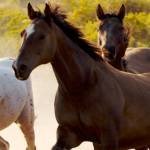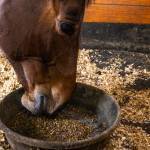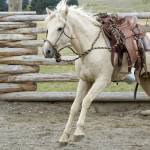Fertility: Wild and Domesticated Horses

For many horsemen, images of feral horses grazing peacefully in the wild, galloping as a herd, or simply moving on to new stomping grounds brings comfort and happiness. This reality is, at times, less idyllic. As pointed out in a recent study* conducted in Australia, wild herds contribute to the decline of native flora and fauna populations, and are thought to spread disease. In some regions of the world, feral horses are considered pests.
Australia is home to one of the largest populations of feral horses. An estimated 600,000 brumbies grace the country’s lands, increasing their population by 20% each year. Feral horses present similar issues for other countries as well, including regions of Europe and the United States.
Methods of equine population control are often “laborious, expensive, and ineffective, markedly failing to reduce the population growth rate,” according to the researchers.
Humane, sustainable, and effective strategies for population control are in various stages of development. As described by Hall and colleagues, those efforts extend beyond simple sterilization vaccination that requires frequent administration. Instead, methods of inducing lifelong sterilization while maintaining normal equine behavior—thereby conserving band fidelity and harem stability—are being explored.
On the flip side, owners of domesticated horse all too frequently suffer the opposite problem: they’re unable to either get or keep mares in foal.
“For a successful breeding season, plan far in advance. Ensure your mare has an ideal body condition score, appropriate diet, and is current on routine preventative healthcare, including dental care, farriery, and vaccination,” advised Catherine Whitehouse, M.S., a nutrition advisor for Kentucky Equine Research (KER).
For more information on broodmare nutrition, explore the following links and topics:
- Broodmare Nutrition: Advantages of Feeding Omega-3s
- Boosting Broodmare Immune Systems
- Mare Condition May Affect Foal Birth Weight
- Colostrum Quality: Nutrition of Mares Key
*Hall, S.E., B. Nixon, R.J. Aitken. Non-surgical sterilisation methods may offer a sustainable solution to feral horse (Equus caballus) overpopulation. Reproduction, Fertility, and Development. In press.








